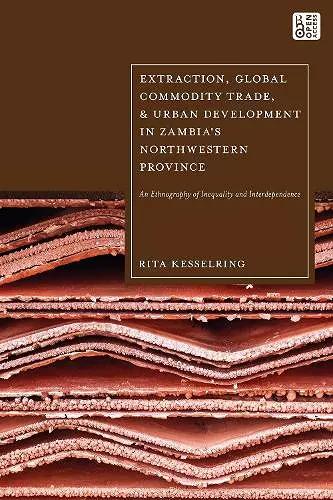Extraction, Global Commodity Trade, and Urban Development in Zambia's Northwestern Province
An Ethnography of Inequality and Interdependence
Format:Hardback
Publisher:Bloomsbury Publishing PLC
Published:6th Mar '25
£85.00
Supplier delay - available to order, but may take longer than usual.

An ethnographic account of the development trajectories of Solwezi, a rapidly growing copper mining town in Zambia, and Zug, an increasingly important urban hub for metal trading firms in Switzerland
Rita Kesselring provides a compelling ethnographic account of the wildly uneven, deeply interconnected development trajectories of Solwezi, a copper mining town in Zambia, and Zug, an urban hub for metal trading firms in Switzerland. In so doing, she provides a valuable open access case study of the unequal interdependencies that global capitalism creates between towns and cities in the Global North and Global South.
Through detailed storytelling, Kesselring explores the lives and routines of state officials, residents, mine managers, and mine employees in Solwezi. From there, she follows Solwezi’s copper as it makes its way through shipping, financing, and trading. Highlighting the key actors in this value chain, Kesselring reveals not only the central role Switzerland plays in Southern Africa's mining industry, but also the central role that Southern Africa plays in Switzerland’s status as a leading service commodity trading hub— thanks primarily to the constant flow of wealth from Zambia to Switzerland.
What emerges from this detailed portrait of inequitable interdependencies is a new way forward. It is only through joint solidarity action between such vastly different but inherently connected places, Kesselring argues, that the world can arrive at more equitable North-South economic relationships.
The ebook editions of this book are available open access under a CC BY-NC-ND 4.0 licence on bloomsburycollections.com.
Meticulously researched, Kesselring’s book maps the copper production network, connecting people, resources, and places. Her rich ethnography takes us from pits in one of Zambia’s copper mining towns to the heart and forces of extractive global capitalism in the global north. She tells a compelling story of relationships and structures of mutual but asymmetrical interdependence that sustain this global extractive industry and its profits. She makes visible the often invisible “Swiss connection”, the other end of global extractivism. Her message, while Zambian and Zug residents may not share a class position, they are tied together by, and embedded in the unsustainable and exploitative global extractives economic order. Acknowledging this interdependence can be the foundation of solidarity, and transnational joint action between the polity in Zambia and Zug. * Asanda Benya, University of Cape Town, South Africa *
This is a highly consequential book for urban studies. This is a highly consequential book for urban studies. It shows how Solwezi, a small mining town in Zambia, is tightly entangled with the Swiss canton and tax haven of Zug. It presents a rich account of the history, spaces and experiences of one urban place associated with and impacted by mining; but it also demonstrates incontrovertibly how Zambia is impoverished by the same processes through which Swiss order and wealth is produced.
Rita Kesselring’s anthropology of the apparently separate but highly interconnected worlds of mine and municipality, expatriate golf estate and local town, “south” and “north” exposes the damage that analytically segregating these places does, both politically and in terms of how urbanisation is understood. In bringing these worlds together, this book marks a major new agenda for urban studies
ISBN: 9781350454309
Dimensions: unknown
Weight: unknown
224 pages